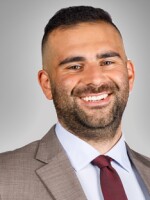BETHLEHEM, Pa.— On the sixth day of Hanukkah, a group of Jewish Bethlehem residents invited the public for a menorah lighting, with speeches condemning the Israel-Hamas conflict and calls to action for state government to support a cease-fire.
The public event was organized byJewish Voices for Peace, a left-leaning, anti-Zionist branch of the Jewish faith, with a presence in the Lehigh Valley.
Jewish Voices for Peace (JVP) is a group that organizers at this menorah-lighting said takes a less supportive stance of Israel than Chabad, who held the public Hanukkah event in the same place the night before. A Chabad banner was still hanging from the stand of the metal menorah at Payrow Plaza near city hall, and organizers at Tuesday's lighting covered it with a banner that simply read "ceasefire."
According to Allison Mickel, a Lehigh University anthropology professor who identifies as Jewish and helped organize Tuesday's event, it is not a "radical" move to disagree with others in the faith on the topic of war.
"I don't see it as radical at all. I mean, I see it as very deeply intertwined with my sense of my Jewish identity, where I was raised from a very young age to understand that Jews think very critically. It's a Jewish commandment to engage in scholarship and reading and thinking about news and about our history and about our commitments to other people. That's very much how I was raised," Mickel said.
"These are Jewish values. And so I don't think it's very radical at all. But there's a lot invested in maintaining the status quo. And so certainly, I've experienced backlash for my views. The Israeli government has taken action against Jewish people like me, who raise my voice, but to me, that just speaks to the necessity of doing so."
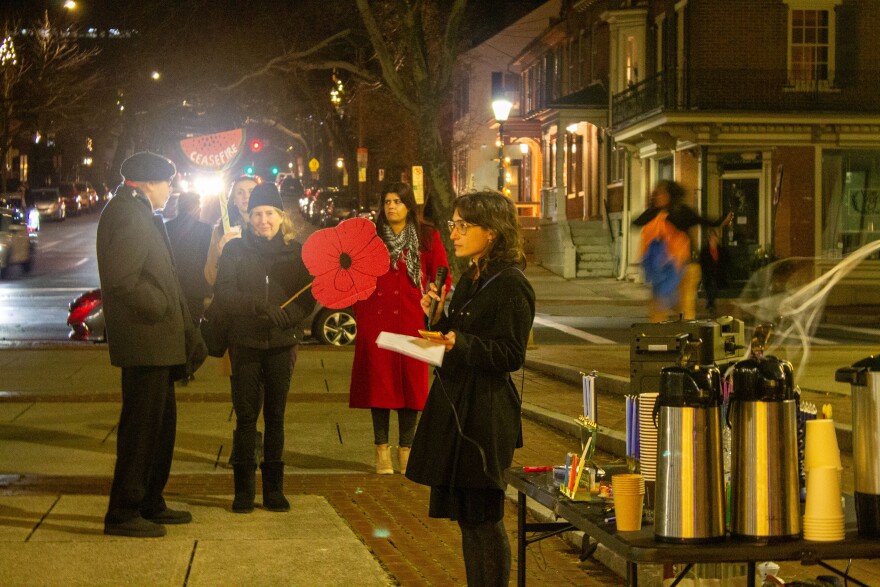
The backlash Mickel is speaking about: for being a member of JVP, according to Mickel, she could not easily clear customs in Israel. She clarified that she has not been individually banned, but her group has been as a whole — though she admits she has no plans of testing her luck at the Israeli border.
Another member of JVP, Cory Fischer-Hoffman, expressed on the podium that Tuesday's lighting of the menorah came with a call to action— she had letters set up on a table ready to be sent off to U.S. Rep. Susan Wild, D-Lehigh Valley, urging her and other government officials to take action to support a cease-fire. Guests at the ceremony were invited to sign them with their names so they could be mailed to Pennsylvania officials.
"I think I'm so empathetic to other people's suffering [in Gaza,] that I can't watch a child or a mother or a father suffering without myself being put right back in that place and just seeing the inhumanity."Mara Nisic, Bethlehem resident and survivor of Bosnian war
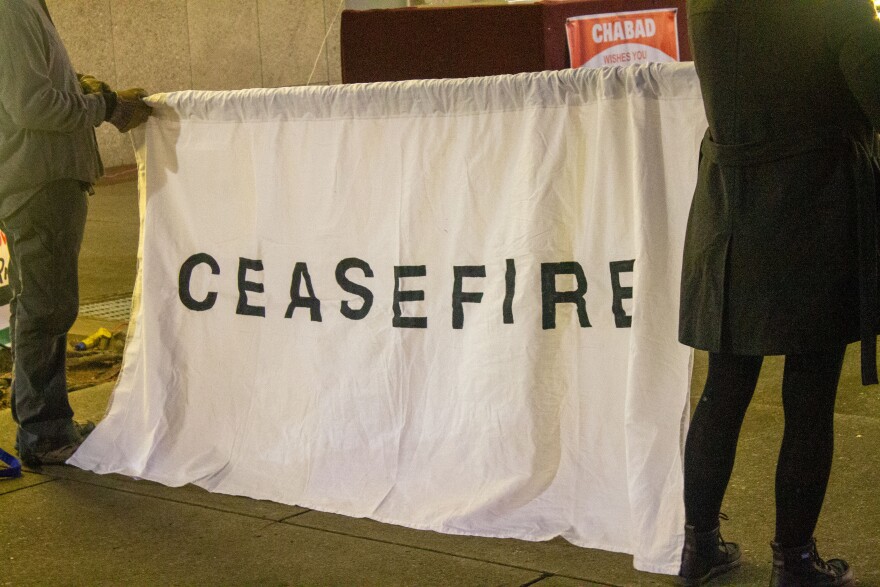
"We are fighting for a world where all children can grow up in safety, freedom and equality," Fischer-Hoffman said on the microphone. "If we do not speak out, we are complicit. As many of our elected leaders stay silent and as more military aid is pledged to Israel, we have come together tonight to light the Hanukkah candles and to demand that a permanent ceasefire be called to end this slaughter."
Candles and keffiyehs
About 75 people turned out to the event on Tuesday, many holding signs that express support of Palestinians in Gaza, many wearing keffiyehs, a traditional Arabic scarf typically worn on the head, which has become a symbol of Palestinian solidarity.
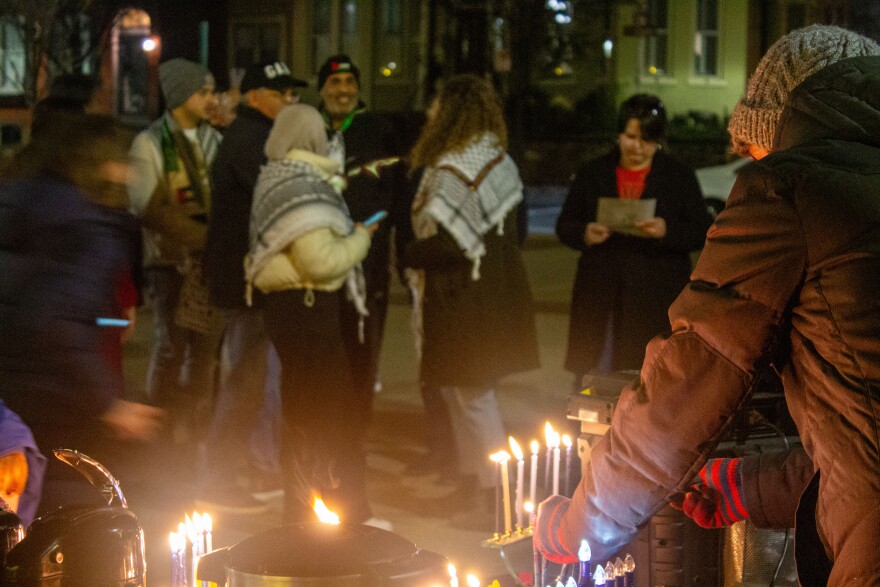
One of the people wearing a keffiyeh was Mara Nisic, who lives nearby, and came out to show her support to Palestinians in Gaza. She said her own experience surviving a war in Bosnia taught her how important it is for Americans to become involved in calling for peace overseas.
"I think that I harbor a lot of trauma and anger, particularly at all religions," Nisic said. "I get very angry about religions, but then I have to really, intellectually walk myself back from that anger.
"I know not all religions are a problem. I know not all religious people are a problem. But it's something I actually have to work through on a fairly frequent basis because of being a survivor of a religious war. But then there are really good sides.
"I think I'm so empathetic to other people's suffering [in Gaza,] that I can't watch a child or a mother or a father suffering without myself being put right back in that place and just seeing the inhumanity."
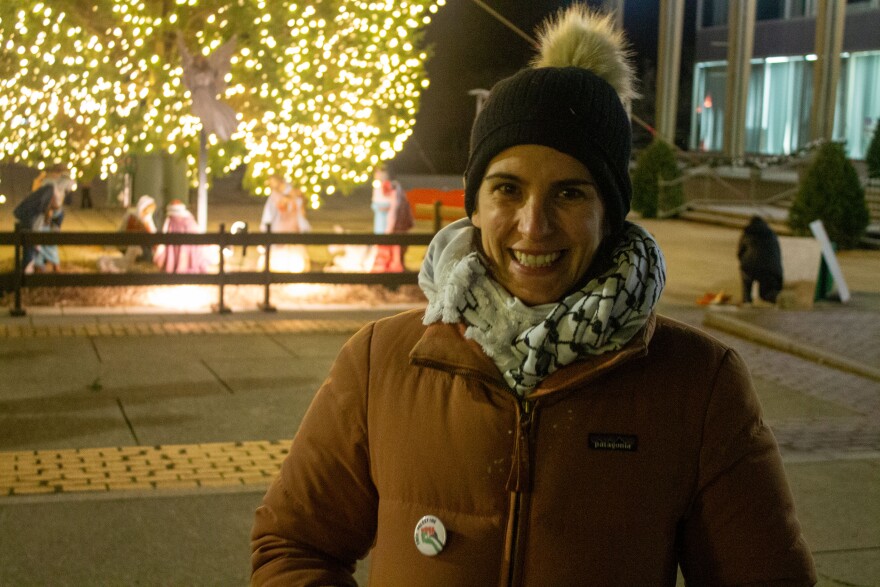
Nisic added that she believes people in Pennsylvania and the Lehigh Valley can do much more than they might think to end wars. She said she believes the war she grew up in, ended in part because of overseas support. Nisic said it only takes five minutes to call state representatives or email them, and ask for them to help voice support for a ceasefire at a national level.
Hanukkah runs until Friday, Dec. 15.


